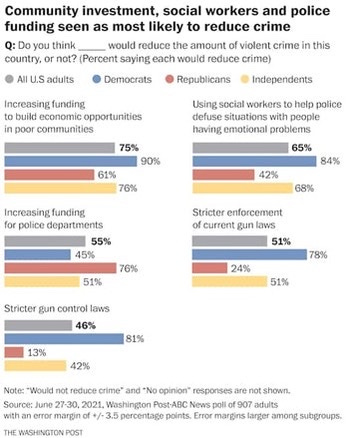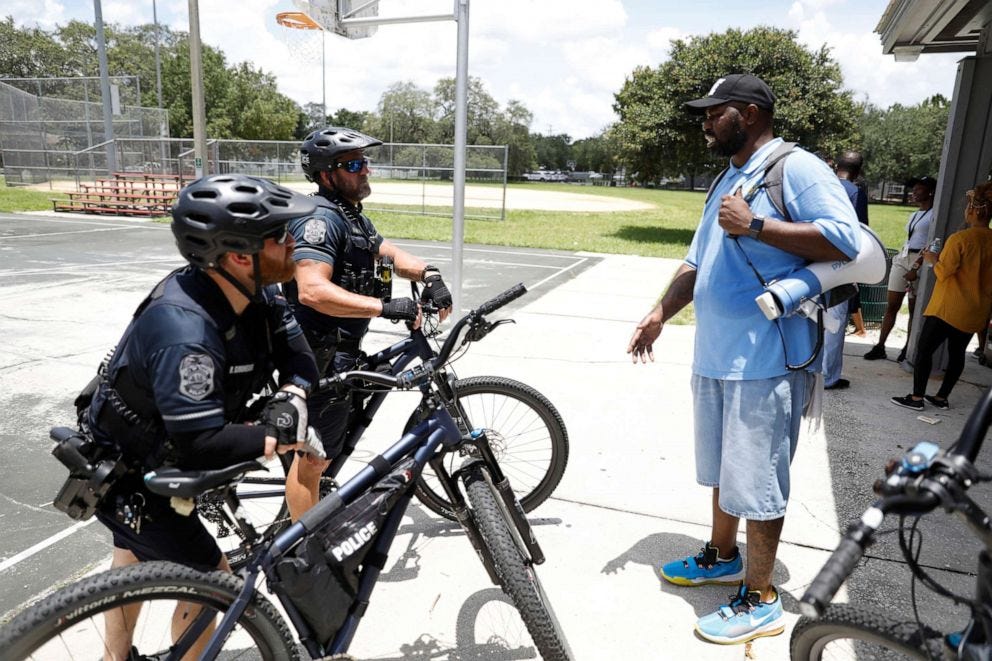Don’t Let Activists Define Policies on Crime Reduction
Majorities of Americans, across party lines, say crime is best reduced by increasing economic opportunities in poor communities
America’s political debate about rising crime and violence in society is blinkered by ideology. From the left, the primary solutions to crime put forth, if offered at all, are addressing police brutality, shifting police budgets, and gun control. From the right, the primary solutions to crime put forth, if addressed seriously and not just used as a bludgeon against foes, are more cops, harsher penalties, and longer prison terms.
Neither side seems to listen to the other one at all. The left thinks the right is ginning up a panic about crime and ignoring problems of race and policing. The right thinks the left is permissive and coddles criminals while attacking cops and downplaying crime. As with all ideological spats, there is always a kernel of truth to each side’s arguments and plenty of anecdotes and selectively plucked statistics to back up the case.
Unfortunately, no one seems to hear the rest of America that does not reside squarely in one of these camps—the broad center made up of middle- and working-class voters of all races.
These voters are worried about rising crime and injustice in policing. They want drugs out of their neighborhoods but think the war on drugs has gone too far in terms of many punishments. Above all, these common-sense voters want pragmatic solutions that get bad actors off the streets and get at the underlying context of most violent crime—poverty and the lack of economic opportunity in too many communities across America.
New polling from the Washington Post/ABC News shows just how important fighting poverty is to most Americans. As seen in the chart below, U.S. adults overwhelmingly agree that “increasing funding to build economic opportunities in poor communities” would reduce violent crime in the country: three quarters of Americans overall agree, including 9 in 10 Democrats, about three quarters of Independents, and more than 6 in 10 Republicans. This notion cuts across racial and ethnic lines as well, including 87 percent of black adults, 81 percent of Hispanic adults, and 73 percent of white adults who believe that increasing economic opportunities in poor communities would be an effective crime reduction tool.
None of the other 4 issues tested is seen as an effective means for reducing violent crime by majorities of people across party lines. However, Americans do express relative consensus, albeit at slightly lower levels, for “using social workers to help police defuse situations with people having emotional problems” as a means for reducing violent crime, viewed as an effective tool by roughly two thirds of Americans, including large majorities of Democrats and Independents and a large proportion of Republicans.
Beyond these two areas, partisan differences are more pronounced whether it’s the idea of stricter gun laws and enforcement or increased funding of police departments. Although there are reasonable arguments for both of these approaches, and more agreement than disagreement on police funding, they also happen to be the two areas most pushed by activists on left and right. Not surprisingly then, in comparison to other measures, these areas produce more polarized responses.
The causes of crime and poverty are complex and interrelated. But Americans certainly understand that violence flourishes in places where jobs, education, and economic mobility are diminished. Drugs, gangs, guns, and violent disputes take over in neighborhoods where people have little hope for a better life. Not all people in poverty get caught up in crime obviously. But poverty does shape the context for decision making and opportunities in ways not always conducive to stability, work, and family life.
So, let’s do something about it.
Rather than fighting over ideologically defined battle lines on crime, let’s press our political class to spend more time focusing on these race-neutral efforts to improve situations for all people living in high poverty areas—as a way to reduce crime and extend American promises of opportunity, liberty, and security to more people.
After an Independence Day weekend marred by violence in too many of our communities, Americans everywhere could use a different approach on crime. Or as President Biden recently stated, we need to promote more policies that can “help make sure young people pick up a paycheck instead of a pistol.” Sound advice.




